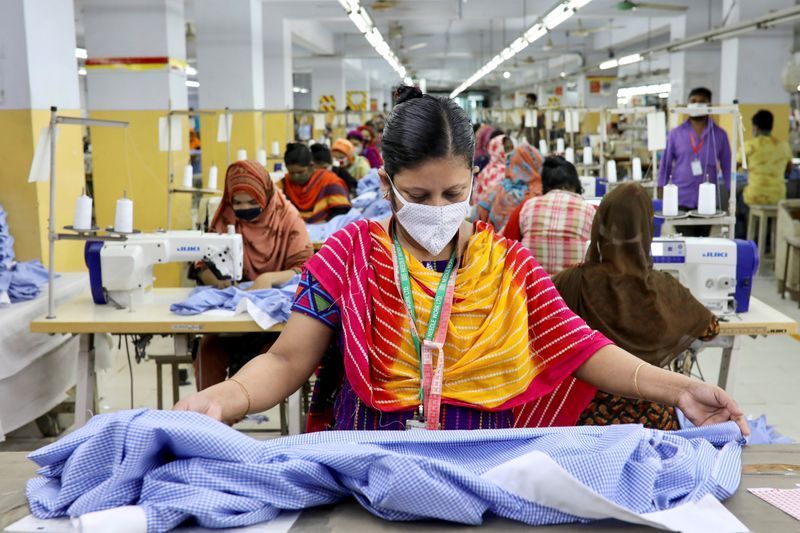
Published :
Updated :

Bangladesh has been well positioned in a global report for its leadership in sustainable apparel manufacturing, as decarbonisation momentum is underway in the readymade garment industry with ambitious environmental targets, rise of green manufacturing and a growing culture of industry collaboration.
The report titled "Bangladesh Country Report: Macroeconomic and Sustainability Analysis," by Cascale launched on June 26 highlights the significant potentials for Bangladesh to coordinate with the Industry Decarbonisation Roadmap (IDR), a sector-wide initiative to reduce greenhouse gas (GHG) emissions by 45 percent by 2030.
The report has also identified a number of challenges, including infrastructure bottlenecks especially congested ports, inadequate transportation infrastructure, occasional energy shortages, high production cost and lead time, dependency on basic garments, bureaucratic and policy hurdles and limited trade agreements that could impede future growth if not addressed.
The report urges brands, investors and policymakers to support Bangladesh's transition by aligning sourcing practices with sustainability goals, offering financial mechanisms for factory upgrades and promoting inclusive growth across the value chain.
Cascale has released two reports-on Vietnam and Bangladesh-based on data drawn from its Higg Facility Environmental Module (FEM). The organisation, formerly known as the Sustainable Apparel Coalition, worked with the Apparel Impact Institute for its report on Vietnam, and followed similar principles for its report on Bangladesh.
According to Cascale, nearly 1,300 factories in Bangladesh contributed data to the Higg FEM in 2023 and the results showed stronger performance than global averages with opportunities to scale up renewable energy use and reduce dependence on natural gas.
The Higg FEM is a self-assessment tool that allows facilities to measure and improve their environmental performance. It covers areas like energy and water usage, waste management, and chemical management.
The report highlights the interim government's Renewable Energy Policy in Bangladesh as a positive factor. This policy, which includes tax incentives and aims to reduce fuel imports, is seen as contributing to a favorable context for shifting towards cleaner energy sources.
Currently, 57 per cent of the country's energy comes from gas and only 2.0 per cent from renewables, it said, adding Bangladesh faces challenges for a green energy transition but sees opportunities in solar energy and in the implementation of more energy-efficient technologies.
The report described BGMEA's (Bangladesh Garment Manufacturers and Exporters Association) new series of targets-Sustainability Vision 2030-as a positive sign as it seeks to assist the industry in reducing its GHG emissions by 30 per cent, switching 20 per cent of its energy usage to renewable sources, increasing sustainable material sourcing to 50 per cent and abiding by zero discharge of hazardous chemicals.
The country is home to more than 240 LEED-certified garment factories with 62 of the world's top 100 highest-rated facilities, the organisation said.
The report concluded that Bangladesh is at a turning point, and its efforts, including its participation in the UN Fashion Industry Charter for Climate Action, "signal readiness to lead a new era of responsible manufacturing".
"Scaling up the decarbonisation of the energy supply will be crucial for Bangladesh to meet its 2030 climate ambitions," said Jeremy Lardeau, senior vice president of Higg Index of Cascale.
"The workforce is both Bangladesh's RMG sector's greatest asset - providing the people power behind its competitive advantage - and its greatest responsibility to protect. By investing in organisational health and safety, fair labor practices, and skill development, Bangladesh aims to uphold and protect the wellbeing of the millions who form the backbone of this industrial activity," said Carolina van Loenen, Director of Stakeholder Engagement, Cascale.
When asked, Sheikh Hossain Md Mustafiz, director of BGMEA, said decarbonisation includes a number of issues, including energy and water efficiency, tree plantation and circularity.
He said at least 500 factories have so far installed solar panels. He, however, pointed out that the major challenge and reality is that everything comes at a cost and requires investments to achieve the targets.
"The reality is different," he said explaining small- and medium-sized factories are struggling both to get well-priced work orders and to meet sustainability goals.
Talking to the FE, Shams Mahmud, managing director of Shasha Denims, said the report reflects the progress and measures Bangladesh RMG industry has undertaken to lead and become the only sustainable sourcing hub.
Bangladesh is doing well although challenges remain for SMEs, he said. Big or compliant factories or those set up during the last decade are energy or water efficient as they are equipped with modern technology, he said.
"SMEs are falling behind as they fail to access the financial supports-either from local banks or foreign funds-due to short periods with high interest rates," he noted.
The same is the case with technology, he said, suggesting that SMEs that could become carbon neutral should be allowed to participate in national carbon cash-on programme through evaluation of the Sundarbans in terms of carbon trading.
The government should take an initiative to evaluate the carbon footprint of the largest mangrove forest to help SMEs get benefit from markets like EU, he said. He further recommended taking scientifically proven measures saying zero discharge requires double or triple energy while all related policies must be integrated.
Munni_fe@yahoo.com


 For all latest news, follow The Financial Express Google News channel.
For all latest news, follow The Financial Express Google News channel.